Commissioning Final Decision
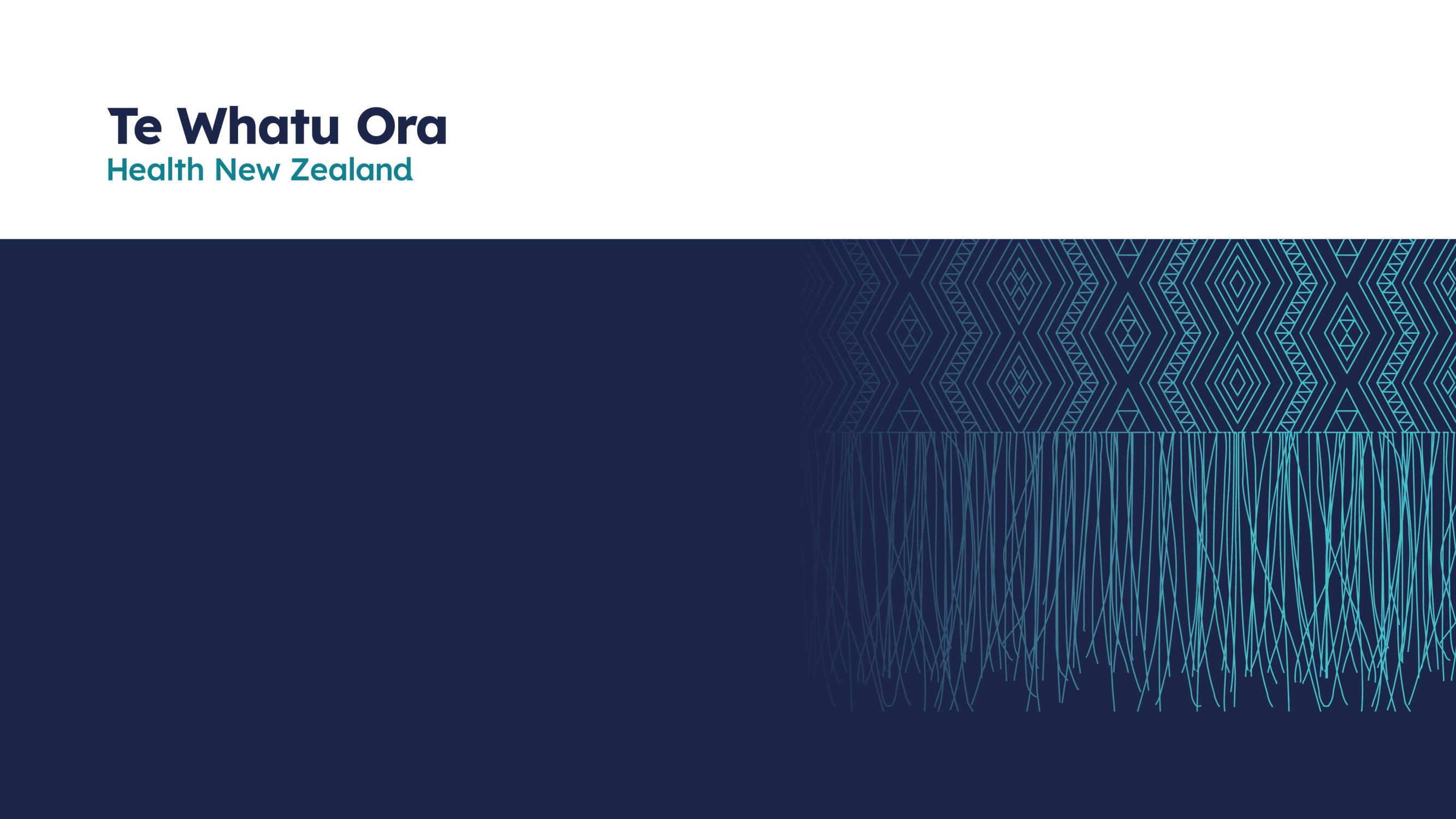


SECTION 1: Foreword
SECTION 2: Our Operating Model
SECTION 3: National, Regional & Local Functions
SECTION 4: Consultation Feedback
SECTION 5: Summary of Changes

SECTION 6: Commissioning Senior Leadership Team
SECTION 7: National Commissioning Team

SECTION 8: Regional Commissioning Team

Our course is now set and the work of reassembling ourselves into teams of teams, focused on serving the needs of communities and whānau, begins in earnest
The decisions in this document represent a significant milestone in our journey toward Pae Ora Like me, I know you don’t take lightly your role in this once-in-a-generation opportunity to build a health system that provides appropriate, equitable and accessible health and wellbeing services for all New Zealanders
While I acknowledge the decisions in this document will mean change for most of us, when I envision the future, it is a future with your skills, expertise and passion in mind. I mean it when I say I want you to work in jobs you love, proud of all that you – and we – are achieving together
The Pae Ora legislation guides us on how to transform the health system to give effect to Te Tiriti, to integrate and improve decision-making, long-term planning and investments for all New Zealanders. Our challenge has been to build a structure that will bring these system changes to life It means achieving real authority for Māori. It means making room for the voices of whānau and communities through localities. It means listening and responding to diverse voices so we can create consistency across the motu, while delivering care in a way that is responsive to local communities It means enabling a culture of partnership to drive change side-by-side with Te Aka Whai Ora and Iwi Māori Partnership Boards.
While some of the roles needed under the old system are no longer fit-for-purpose given our move to one organisation, you will see hundreds of new roles that have emerged in the new structure which draw on the same skills, expertise and passion Good people are needed within our health system now more than ever.
Thank you for sticking through this process Thank you for taking the time to submit feedback With over 2500 submissions, reviewing, collating and analysing this feedback has taken time, and I thank you for your patience while this work has been done I can assure you that every line of feedback has been read, considered and reflected on.
Your input has improved this final structure. I hope that you will see in the final analysis that we have listened and, in as many cases as possible, have acted upon your feedback within the abilities of our budget.
Thanks to your feedback, we have been able to:
• articulate a structure that better addresses Te Tiriti, including a community of practice for Māori leadership
• enhance functions to support equity for key populations
• support teams to function better with administration support
• develop clear career pathways, and
• better describe roles to recognise subject matter expertise.
Leaving behind old teams to form new teams, new friendships and new challenges can be very difficult, and I want to acknowledge and thank you for staying the course. I have also heard your enthusiasm to embrace new challenges and your desire for us to get on with this process as soon as possible And so, we are here at last
I hope now as you read and digest this final document, that you are energised for the future and that you are energised to drive Pae Ora with us. The cultural shift to achieve the new ways of working will be complex and challenging, but I am committed to see this journey through with as many of you as possible

 Ngā mihi Abbe Anderson
Ngā mihi Abbe Anderson
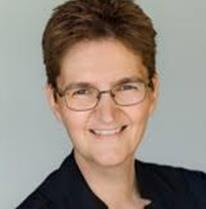
He iti hau marangai e tū te pāhokahoka
First comes the light wind, carrying rain, then comes the rainbow.
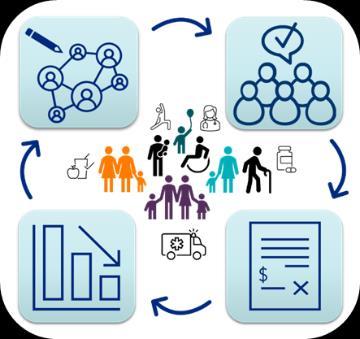
The purpose of commissioning is to design, plan, fund and monitor community-based health services across the system to improve the well-being of whānau and communities and address persistent inequities in access and outcomes. Commissioning is a process that informs Te Whatu Ora’s short-, medium- and long-term health investment decisions, including hospital and specialist care, based on the current and projected needs of Aotearoa’s population. Commissioning relies on strong engagement with and leadership from sector experts, service providers, people with lived experience, diverse voices, care partners, communities and whānau. Commissioning seeks to promote behaviour as a single health system, removing fragmentation, streamlining care paths and using technology to connect providers and enhance patient experience and outcomes.
Provider thinking System thinking
Service centric
Iwi Māori an after thought
A focus on medical & treatment models
Whānau centric

Iwi Māori the first thought
A greater focus on prevention models
Everyone ‘gets the same’ Simply, intensify
One size fits all Range of services and ‘doors’
Workforce not reflective of the population Workforce matches the population it serves
Low trust, high bureaucracy
Decision-maker
Transactional interactions

Short term, unsustainable funding
Focus on costs
High trust, low bureaucracy
Collective decision-making
Relationships, mindsets and behaviours
Long term, sustainable funding
Focus on value - what matters to whānau, outcomes and impacts
A fundamental principle of commissioning is to ensure a diversity of voices leads the design of Aotearoa’s health care system. Promoting wellness, preventing illness and influencing the social determinants of health are key objectives of system design alongside honouring our Te Tiriti commitments, achieving equity of access and maximising outcomes from public funds. This involves deliberate, coordinated and well-informed planning to achieve consistent, and less fragmented, services across the motu. Understanding the evolving expectations and aspirations of society is critical to this mahi as is nurturing a robust and fit-for-purpose workforce. Te Aka Whai Ora, Manatū Hauora, Te Aho o Te Kahu, Whaikaha and many other agencies are key partners in this mahi.
The Commissioning team ensures contractual obligations are met, but more importantly, that outcomes are achieved that fulfil Te Tiriti commitments, Pae Ora reform intentions, aspirations of communities and whānau and original system design intent. The results from monitoring are fed back into the commissioning cycle to achieve continuous improvement.
People in Commissioning are already shifting how they work, with a much more relational approach, grounded in partnerships, understanding patient, community and Whānau aspirations, simplified and reflective of the bigger system picture. We are looking to build on this and how we do our mahi, and this table signals how we want to connect with our partners across the system and build on the shifts already occurring.
Te Whatu Ora is divided into four regions: Northern, Te Manawa Taki, Central and Te Waipounamu. Each region is led by a Regional Integration Team (RIT) that oversees integrated planning across hospital and community care. RITs work closely with a wide range of partners to develop plans including locality plans as set out in the Pae Ora (Healthy Futures) Act 2022.
Planning decisions are:
• guided by national specifications for efficient health service delivery;
• informed by evidence and diagnostic analysis about people, place and investment;
• refined according to local community & whānau priorities.

The commissioning function also informs long-term investment decisions needed to ensure a healthy future for Aotearoa.
The Commissioning function is responsible for the expenditure of over $8b per annum to fund community-based services, in accordance with agreed national, regional and locality plans Te Whatu Ora’s Commissioning team oversees contracting processes designed to clearly articulate the service levels and outcomes expected in return for funding provided


The Commissioning team operates as a team of teams under a servant leadership model in which national teams serve regional teams who serve local teams who, in turn, directly serve communities and whānau

The Commissioning team is responsible for delivering on many of the reforms outlined in the Pae Ora (Healthy Futures) Act 2022, including the roll out of localities by 2024 and the development of locality plans by 2025
The Commissioning team is also responsible for a large share of actions in Te Pae Tata (Interim New Zealand Health Plan 2022) and for the continued implementation of numerous government initiatives from previous Vote Health budgets

The Commissioning team’s mahi is guided by the health system principles, contributes to the five system shifts and upholds the four Pou of Te Mauri o Rongo (the New Zealand Health Charter).
Communities & whānau
The key goal of Commissioning is to ensure the population has appropriate, equitable and accessible health services that meet their diverse needs Best practice commissioning listens closely to communities to understand evolving expectations and recognises the role whānau play in supporting wellbeing The localities approach ensures influence is in the hands of communities and whānau
Providers of care
The majority of care in Aotearoa is provided outside of hospital, in the community and in people’s homes. Commissioning funds, supports and coordinates these providers and partners with them to identify the most effective, efficient and sustainable workforces and models of care to meet the country’s growing care needs. Commissioning recognises the critical role of whānau, carers and care partners as well as emerging workforces such as kaiāwhina roles.
Partner networks











Commissioning works closely with a number of partner networks in the community such as Iwi Māori Partnership Boards (IMPBs), Locality Partnership Groups and Primary Health Organisations (PHOs), each of whom participates in planning, organising and, in some cases, funding primary and community health services. These partner networks are in addition to many other critical relationships with industry peak bodies, colleges, provider collectives and NGOs.
Our Priorities over the coming 18 months
Design

• Major systems of care
• Partner networks
• Team roles
• Team culture
• Te Tiriti
• Equity
• Localities
• Diverse voices
• Team of teams
• Sector leadership
• Clinical leadership
• National, regional, local model
• Te Pae Tata and major work programmes

Simplify
• Engagement with us
• Our contracts
• Our reporting requirements
• Our health system
At the national level, Commissioning’s clinical leadership, equity leadership and system design teams partner with sector leaders, providers, people with lived experience, diverse voices and community members and their whānau to design systems of care
National functions are those that should be done once, to avoid duplication and increase consistency, and that enable more streamlined engagement and contract management for larger care providers with nationwide service delivery footprints.
National functions serve regional teams and provide key connection points for a range of cross-organisational “business partners” (e.g. Finance, Communications).
Commissioning’s system design teams are organised according to the life course: starting well, living well, mentally well and ageing well





In keeping with Te Pae Tata, the Commissioning team’s national system design work is guided by Strategic Design Networks that include a range of sector leaders, clinicians, providers, people with lived experience, diverse voices and community members and their whānau.

These groups are time-limited and come together to lead national conversations to inform the development of long-term road maps for Manatū Hauora’s policy-settings and for Te Whatu Ora’s funding and service design decisions

The Commissioning team’s regional structure is the critical connection between national planning work and the tailoring of service delivery to meet the priorities identified by communities and whānau through the localities planning process.
Regional functions ensure investment is well-planned and distributed equitably across Aotearoa These teams focus on implementing regional Te Pae Tata priorities as well as priorities identified via locality plans They understand and monitor population health outcomes and support service improvement and integration as outlined in Regional Health Services Plans. Regional teams hold key provider and wider social sector relationships and support procurement of a wide range of community health services.
Each Te Whatu Ora region has Regional Integration Teams (RITs) co-led by commissioning’s Regional Wayfinders and Te Aka Whai Ora’s Regional Directors. RITs bring together leadership from Hospital and Specialist Services, Pacific Health, National Public Health Service and System Improvement and Innovation to work with partner networks such as Iwi Māori Partnership Boards (IMPBs) and Locality Provider Networks to plan delivery of hospital services and the commissioning of primary and community services in alignment with the priorities identified in Regional Health & Wellbeing and locality plans
The map over the next page shows the four regions in which the regional teams operate:
• Northern

• Te Manawa Taki
• Central
• Te Waipounamu
As IMPBs are gazetted and locality boundaries are agreed, these areas will be added to the regional maps and will influence the way in which the commissioning team is organised.
For most regional roles, team members should be able to work from anywhere within the region (and possibly further afield).
Senior Locality Managers and Locality Development Advisors are expected to live locally in one of the localities that they serve.


Mentally Well Ageing Well Starting Well Living Well
STRATEGIC DESIGN NETWORKS
Localities are a key new feature of Aotearoa’s reformed health care system. Localities aim to help achieve better, more equitable wellbeing outcomes for all people in that area, based on what is important to their communities and whānau.
The objective of localities is to enable local communities and whānau to influence the design, funding, and delivery of their local health care services. This will be done by creating a locality plan that determines hauora priorities for those communities and which influences how health dollars are spent in that area.
Te Whatu Ora and Te Aka Whai Ora are leading the implementation of the localities framework and will support communities by:
• Partnering with Iwi Māori Partnership Boards and engaging local authorities to determine geographic areas for localities by mid-2024;
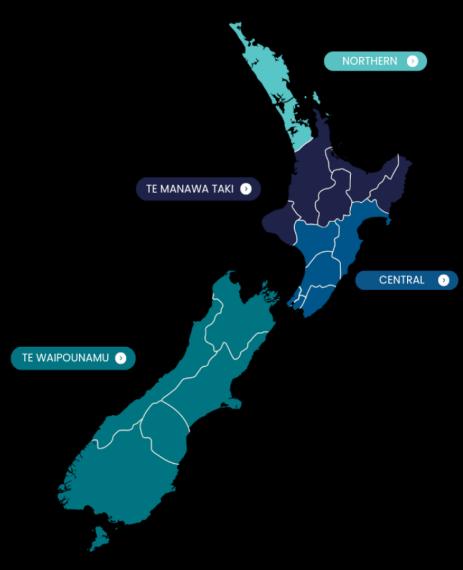
• Working with Iwi and Māori, communities, consumers, whānau and other stakeholders to establish Locality Partnership Groups in each geographic region The groups will be responsible for oversight of locality planning processes, including identifying local priorities through deep engagement with providers, communities and whānau within each locality;

• Providing resources and data to Locality Partnership Groups to enable the development of comprehensive locality plans that capture wellbeing aspirations with clear, measurable goals that matter to local people;
• Collaborating with Hauora Māori service providers, local healthcare, and Pacific service providers to enhance the coordination, accessibility, and responsiveness of services, while also expanding the options available for service delivery to all members of the local community;
• Considering locality plan priorities in the design and provision of hospital and specialist services across a region;
• Ensuring integration of provider networks within the locality and anchored with regional hospital and specialist services;
• Through a collective impact approach, engaging other national and local government agencies to encourage investment in the priorities identified in locality plans, aiming to address social determinants of health and meet wellbeing goals of importance at the local level.
Localities will create a collective local voice that influences health service planning to improve hauora and wellbeing for everyone in their area.
In each locality, people will come together to determine local priorities, elevate the involvement of Māori, work with provider networks, shape local services and influence how health dollars are spent in that area, all with the aim of making a real difference in the health of people and their whānau.

The establishment of Iwi-Māori Partnership Boards (IMPBs) is part of the health and disability reform’s commitment to recognising Te Tiriti o Waitangi and delivering better health outcomes for Māori.
IMPBs are the primary source of whānau voice in the system and influence regional strategies through Te Aka Whai Ora:
• They create an authentic vision and strategies for addressing their shared concerns and solutions to improve the health system
• They enable iwi, hapū and whānau to exercise rangatiratanga in their rohe
• They ensure tāngata whenua voices are heard and local health services reflect those who need and use them
IMPBs

The following graphic demonstrates the inter-relationship between the work of strategic networks, national and regional commissioning teams, and locality planning processes to achieve whānau-led commissioning for Pae Ora.
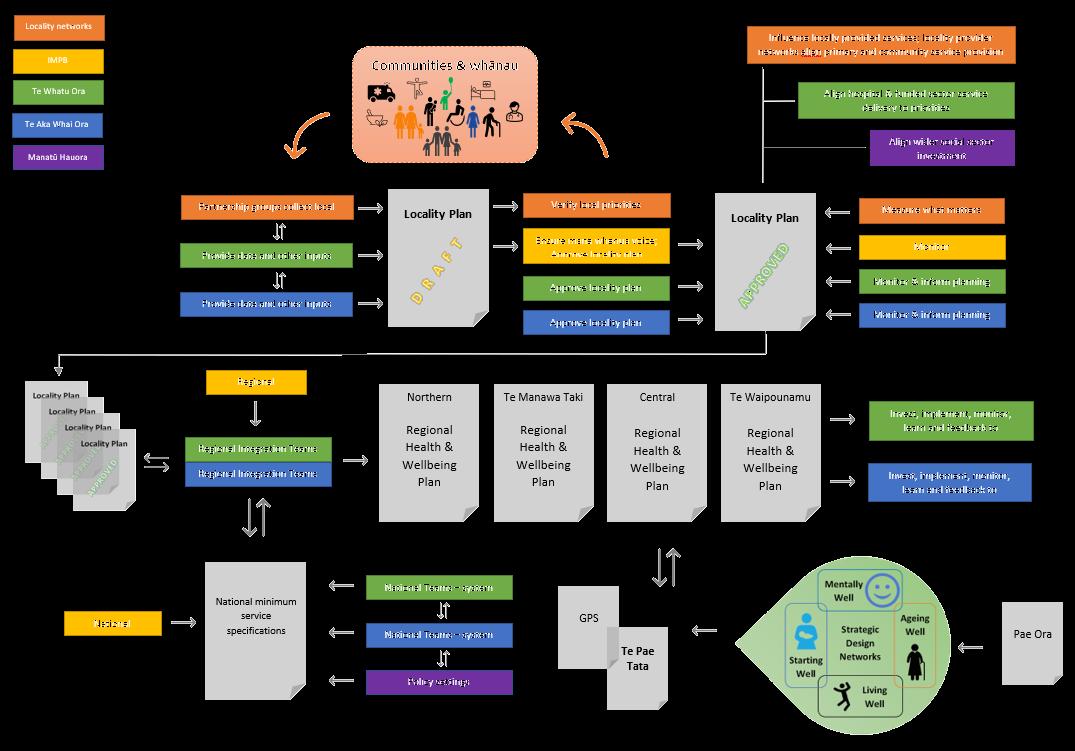

Thank you for all the feedback we received on the Commissioning proposal over the period of consultation across April and May 2023. In finalising this proposal, we held over 70 meetings with groups of staff across the motu from Whangarei to Dunedin. We also received over 2500 submissions made up of individual WhatSayYou submissions, group submissions or individual submissions outside of WhatSayYou.

An analysis of the summary feedback by topic is identified below. We have made substantive changes to the final structure, largely responding to the submissions and feedback received. The following section highlights the key themes from the feedback and how we have addressed these in the document.
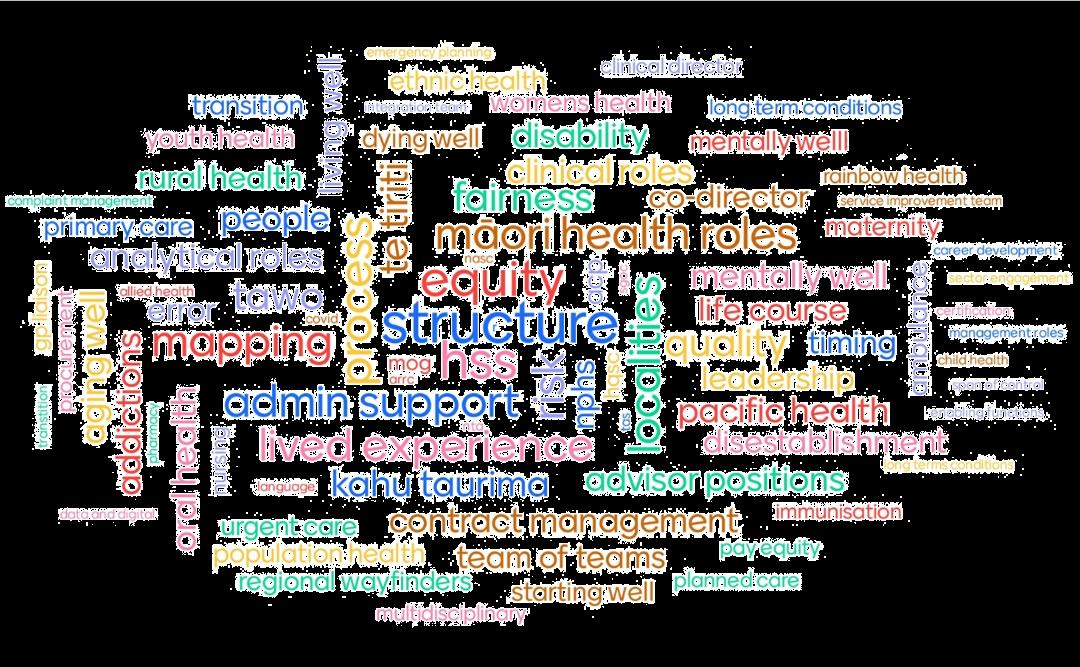
Key themes of support
• Support the vision of a health system planning process that reflects community priorities
• Support the attempt to reduce repetition of roles and manage the vertical, functional nature of the new structure while ensuring regional and local leadership across health.
• Opportunity to work in closer collaboration with regional colleagues and for local communities to have more influence on national direction.
• Opportunities for increased collective impact across agencies and stronger relationships with iwi and input from Māori communities, and increased focus on responding to local community needs.
• Focus on life course positive, as well as the deliberate inclusion of a national and regional primary/community clinical director/s and retention of clinical advisors in the regional team.
“Looks like an exciting change process, Hopefully the streamlining of this across all four regions will reduce duplication and ensure consistency of service provision. Please don’t lose this in the change process – we are more similar than we are different.”
Key concerns Process
• The significant size of the impact, the process undertaken and the timeframes for completion.
• Poor process, so many mistakes along the way, mapping process poorly managed and appeared to be inequitable treatment of roles.
• Timing of HSS consultation and difficult to provide feedback without knowing the pieces of the puzzle
• People could ‘not see themselves’ in the structure due to the lack of detailed description of the roles.

• How to maintain business continuity in such a significant change and increasing resignations
• Unclear about what projects or programmes will continue as we move into new model.
• The structure does not have enough Māori-specific roles across its functions
• Expectations on Te Aka Whai Ora to support Commissioning, particularly given their size and their role monitoring Te Whatu Ora.

• The operating model does not reflect Māori/hapū values
“Reliance on Te Aka Whai Ora will at times be incompatible with the important role they have in holding us to account or take them away from their own critical commissioning work’”
• Themes around the ‘fragmentation’ of commissioning functions across HSS, NPHS, Pacific and Te Aka Whai Ora and inability to understand the operating model that describes the whole
• Teams of teams and distributed leadership – difficult to understand how that will operate and how key roles such as the Senior Locality Manager could influence the work flow of advisors if they don’t report to them
• Service provision is reliant on the whole of system working.
• The locality model is not well enough resourced to deliver on Pae Ora
“Without an overarching operating model, it is difficult to see how integration will be supported. Communication will be vital in the new model”.
• Lack of visibility of important equity roles – tāngata whaikaha, lived experience, consumers, rainbow community, refugee and ethnic communities
“Where is the prioritising of the needs of Māori, Pacific peoples, Disabled people with a pro-equity focus?. The proposal does reflect this but doesn’t describe the ‘How’.”
A lot of feedback on various components of FTEs but a general theme that the reduction in FTEs is not sustainable for implementing Te Pae Tata and implementing Pae Ora. Particular focus areas were:
• Locality FTEs too light - Lack of FTEs to support the significant operational management components that many commissioning teams currently undertake (particularly district teams).
• Lack of FTEs to support the significant ministerial servicing that predominantly occupies national teams.
• ‘Specialisation’ of roles - particularly where roles were primarily generalist
• FTEs were too light to complete the work required, and were not bespoke for different regional populations.
• Lack of analytical functions in Northern and Southern regions and feedback as to whether analytical functions should be centralised or not (both within teams and across national/regional)
• Quality assurance function too light (particularly to support aged care) and again geographically based.
• Lack of recognition of GP liaison roles and the need to maintain these as front-line staff
• Reduction in administrative roles supporting teams – covering generally team administrators, contract administrators and executive assistants.
• Not enough junior or graduate entry roles.
Below is a summary of the changes to our final structure. It does not capture individual feedback on individual roles. There has been some movement of roles across teams to create the space to create additional roles in areas that were particularly under-resourced based on the consultation feedback. This has resulted in a net increase of 27 roles on the original proposal of 667 to create the final commissioning structure of 694 roles.
This figure excludes the 100 clinical and programme delivery roles such as those in Northern region (Mangere Refugee Centre) and Te Wai Pounamu (PHO Management services), as well as those roles that are funded via a Funder Budget rather than an operational budget (e.g. Mana Ake roles, HIV Action Roles, GPAC roles). With the inclusion of those figures, the proposed structure is 794 roles.
There was significant feedback that the proposal could not help fulfil our Te Tiriti obligations and ensure Hauora Māori is achieved There was concern the current proposal lacked the depth of Te Ao Māori expertise across the Commissioning function to realise the aspirations of the reforms and ensure Commissioning has the capability to operate effectively. Furthermore, it was noted that the creation of Te Aka Whai Ora does not negate the need for Te Whatu Ora to have its own capability, and that we cannot rely on Te Aka Whai Ora alone to carry the weight of Māori aspirations for achieving Hauora Māori and equity.
We agree that Te Whatu Ora needs Te Tiriti expertise across our teams if we are to realise our potential. This will require us to recruit purposefully to embed these skills and ensure all staff are able to apply Te Tiriti consistently in their work We expect our initial capability to be variable and staff will need to be supported with training Te Tiriti provides the foundation which must be implemented throughout our design and functions A further important consideration is provided through Te Mauri o Rongo which we expect to activate emphasising the continuous pursuit of equity
As a result, we propose establishing, through our recruitment and competency framework, Māori expertise to ensure the right voices are involved at the outset of any work and we embed Māori capability throughout the Commissioning function nationally and regionally within teams.
As part of the final function, we will seek to grow and achieve a high level of Te Tiriti and Hauora Māori capability through a commitment to recruit both Māori staff, and staff who have a high level of Te Tiriti and Hauora Māori equity competency.

Roles would sit in the structure and carry out commissioning activity within their areas They would also work as an integrated Hauora Māori matrixed team with the Māori Director and Chief Māori Advisor This will enable a community of practice for Māori leadership and knowledge systems empowered to drive Te Tiriti and a focus on Hauora Māori within Te Whatu Ora and enhance relationships with Te Aka Whai Ora.
We will work towards 20% of positions across Commissioning to be tagged to this group and be demonstrating allyship as Te Tiriti activators and Hauora equity champions. We will expect these roles to have a high level of competence in Te Tiriti and equity for Māori, and will provide the support and development to increase our staff competency as Te Tiriti allies.

These roles will take a specific Hauora Māori focus within their integrated Commissioning teams They will lead giving effect to Te Tiriti and equity for Māori across their teams while working as a Senior Localities Manager, System Design Manager, Service Development Manager for example We anticipate training will be underpinned by Te Tiriti Principles as described by the Waitangi Tribunal in Wai 2575, Hauora Stage One report and Te Mauri o Rongo, NZ Health Charter. Two capability development pathways are envisaged: one for Māori staff and one for nonMāori staff. For non-Māori staff, the key goal is competence in applying and reinforcing Te Tiriti, with three priority learning areas:
1. Allyship to Te Tiriti and Te Tiriti based equity for tāngata whenua
2. Te reo me ōna tikanga
3. Relationships with iwi, hapū and whānau
While the proposal identified the importance of working with priority communities in the design of services across national, regional and local levels, there was overwhelming feedback that the Commissioning structure needed dedicated roles to support work around key populations As a result, the final structure has dedicated roles to support the work which will be led out from the Office of the Chief Executive for disabled people (in the form of Chief Advisor and Principal Advisor), ands the lived experience and Rainbow communities. Dedicated roles focussed on refugee and migrant communities across both national and regional teams where there are significant populations have also been identified.
There was consistent feedback in the submissions around the lack of clarity around where particular functions sat across the life course (particularly across Starting Well and Living Well).
There was also considerable feedback that ‘people could not see themselves’ in the proposal due to the lack of clarity both in naming conventions (dealt with separately in this section) but also the generic use of titles without a clear portfolio or service area to focus on While to some extent this was done deliberately in the first proposal to ensure that teams operated as teams and shared programmes of work, we also understand that people do have a predominant area of subject matter expertise which they can likely focus on as part of a team (while being available to put their focus and effort across other parts of the business too). Hence throughout the structure, System Design Manager and Service Development Manager roles tend to refer to either a particular subject matter or a life course area (e.g. System Design Manager, Oral Health).
There was consistent feedback from the submissions that some teams appeared light in terms of administrative and management support, and that there was not enough administrative support across teams to enable them to function appropriately. Throughout the document and detailed below, an additional 23 administrative support roles have been added including Team Administrator roles and a larger number of Executive Assistants to support Directors and Group Managers across the structure. The number of contract administrator roles has increased by 12 across the four regions (an additional three per region).
There was consistent feedback that the structure did not have a good balance of junior or graduate entry roles across teams and was ‘top heavy’. The presence of more junior or graduate entry roles was critical to functioning of teams, provided a career path for graduates, and added a different culture across teams. As a result, many of the teams now have Advisors as part of their structure, which are primarily graduate entry level roles
There was significant feedback in the naming conventions of proposed titles including:
• The generic use of the titles Principal Advisor, Senior Advisor and Advisor to describe a broad scope of functions was confusing, particularly with its association with what were seen as primarily policy and ministerial servicing roles that previously sat within the Ministry of Health (and which continue to be used within Manatū Hauora).

• The lack of differentiation between Service Development Manager and Advisor roles, given that the scope and function of both roles seemed similar.
• The use of the title ‘Personal Assistant’ which was seen as derogatory and poorly descriptive of its function.

• The title and placement in the structure for Co-director – Mentally Well and Living Well. The feedback was that while 'co-director' implies alongside and equal, the roles look sub-ordinate.
In our proposed structure, we had 24 clinical roles across national and regional teams These roles were there primarily to support service design and implementation in the national design and regional integration teams There was feedback about gaps in some of the areas from a clinical perspective, and considerable feedback about the importance of the local clinical interface between HSS and primary care, particularly in the implementation phase of integrated programmes of work that regional clinical roles would find hard to lead. As a result we have increased the number of clinical advisors at both national and regional levels and also introduced a new role of Locality Clinical Integrator. The Locality Clinical Integrator roles will support the Senior Locality Managers to implement locality integration programmes of work. This has doubled the number of clinical FTE from the proposed structure to the final structure from 24 to 48 FTE.
The National Director, Commissioning, is a member of Te Whatu Ora’s Executive Leadership Team, providing a direct line of accountability to the Chief Executive and Board of Directors A number of members of the Senior Leadership team have dotted reported lines to other business units across commissioning (namely the Director, Funding and Investment; the National Clinical Director, Primary and Community Care; and Director, Māori Health
The Commissioning’s National Clinical Director, Primary & Community Care has a dotted reporting line to Te Whatu Ora’s Chief Clinical Officer, who is also a member of the ELT. This relationship is designed to embed a primary care view into Te Whatu Ora’s top clinical leadership team. This relationship also signifies Te Whatu Ora’s recognition of the criticality of primary and community care and the importance of creating an environment where hospital and community-based providers can behave as a single, well-supported health system.
Te Aka Whai Ora is a commissioner of Hauora Māori services and works closely with Te Whatu Ora’s Commissioning team to ensure alignment of functions and priorities. Te Aka Whai Ora is also a monitor of Te Whatu Ora’s performance and has a key role in ensuring equity outcomes are achieved A member of Te Aka Whai Ora’s ELT is a key partner in setting direction in the Te Whatu Ora Commissioning leadership team and the National Director, Māori Health has a dotted reporting line into Te Aka Whai Ora’s leadership The National Director, Māori Health also has a dotted reporting line to Te Whatu Ora’s Maiaka Whakaruruhau Tikangi (Chief of Tikanga)
The National Senior Leadership Team was one of the smallest across the Te Whatu Ora business units consulted. While there is strength in a small leadership team, the strategic and managerial thought leadership and operational support for the Director has been bolstered in the final structure.
Given the significant scope and breadth of the work across Commissioning and the need to hold critical internal and external relationships across senior stakeholders, a Chief of Staff, Commissioning has been established. The Chief of Staff works directly with the National Director, Commissioning in a key strategic and trouble-shooting role, providing strategic and management support. They may also lead out on key strategic programmes of work as required The role will work closely with the Senior Leadership team and across Te Whatu Ora and Te Aka Whai Ora to achieve common goals and collective impact
Northern Regional Wayfinder
Te Manawa
Taki Regional Wayfinder
Central Regional Wayfinder
Integrated planning, procurement & implementation
Te Wai Pounamu Regional Wayfinder
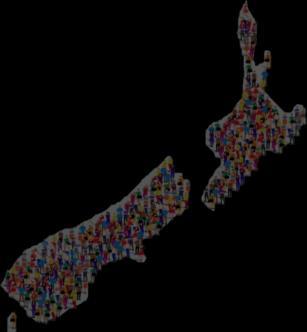

Director, Funding & Investment
Funding & Investment System Design
Deputy National Director, Commissioning & System Design
Director, Māori Health
Te Tiriti Leadership
Te Aka Whai

Ora DCE Service Development
National Director, Commissioning
Direction Setting
Director, Office of the National Director
Chief of Staff, Commissioning Path Smoothing
National Clinical Director, Primary & Community Care
Clinical Leadership
The members of the Commissioning Leadership team work collaboratively both across their teams (region to region and regional to national) and across other Te Whatu Ora service delivery partners (Hospital & Specialist Services, National Public Health Service, Service Improvement & Innovation and Pacific Commissioning) and enabling partners (People & Communications, Data & Digital, infrastructure & Investment and Finance) to ensure Commissioning takes a partnership approach to delivering on the expectations of Pae Ora.
The Tikanga Advisor is a dotted line to the National Director, and a full reporting line to Chief of Tikanga, Te Whatu Ora.
Director, Māori Health
An Executive Assistant to support the Chief of Staff and the Director Māori Health in the Senior Leadership Team has also been established

National Director, Commissioning
Tikanga Advisor
Chief of Tikanga, Te Whatu Ora
Director, Māori Health
National Clinical Director, Primary & Community Care
Deputy National Director, Commissioning & System Design
Chief of Staff, Commissioning
Director, Office of the National Director Director, Funding & Investment Regional Wayfinder (4)
Director, Māori Health

















Executive Assistant (shared with Chief of Staff)
Chief Advisor, Māori Health

The commissioning team operates as a team of interconnected teams. National functions are those that are able to be done once and on behalf of the whole team. These are functions that do not need to be repeated multiple times by teams in different locations. Completing these functions once yields efficiency and is aimed toward reducing variation and inconsistency. For example, local pricing for services that are otherwise the same should be standardised and contracts harmonised to reduce unnecessary administration.
Team members performing national functions should be drawn from across the motu to capitalise on the depth of experience and views that comes from diversity and local knowledge Team members are able to work remotely including from home, where suitable and agreed
The national system design team is led by the Deputy National Director, Commissioning & System Design, and consists of the Localities Design team and the four life course teams of Starting Well, Living Well, Mentally Well and Ageing Well. All have strong links to the Regional Teams, and in particular the Regional System Integration Teams who also have design and clinical leads supporting system design and implementation at a regional level. The national Localities Design team also support locality teams to implement successful localities through a learning collaborative and development of consistent systems and processes
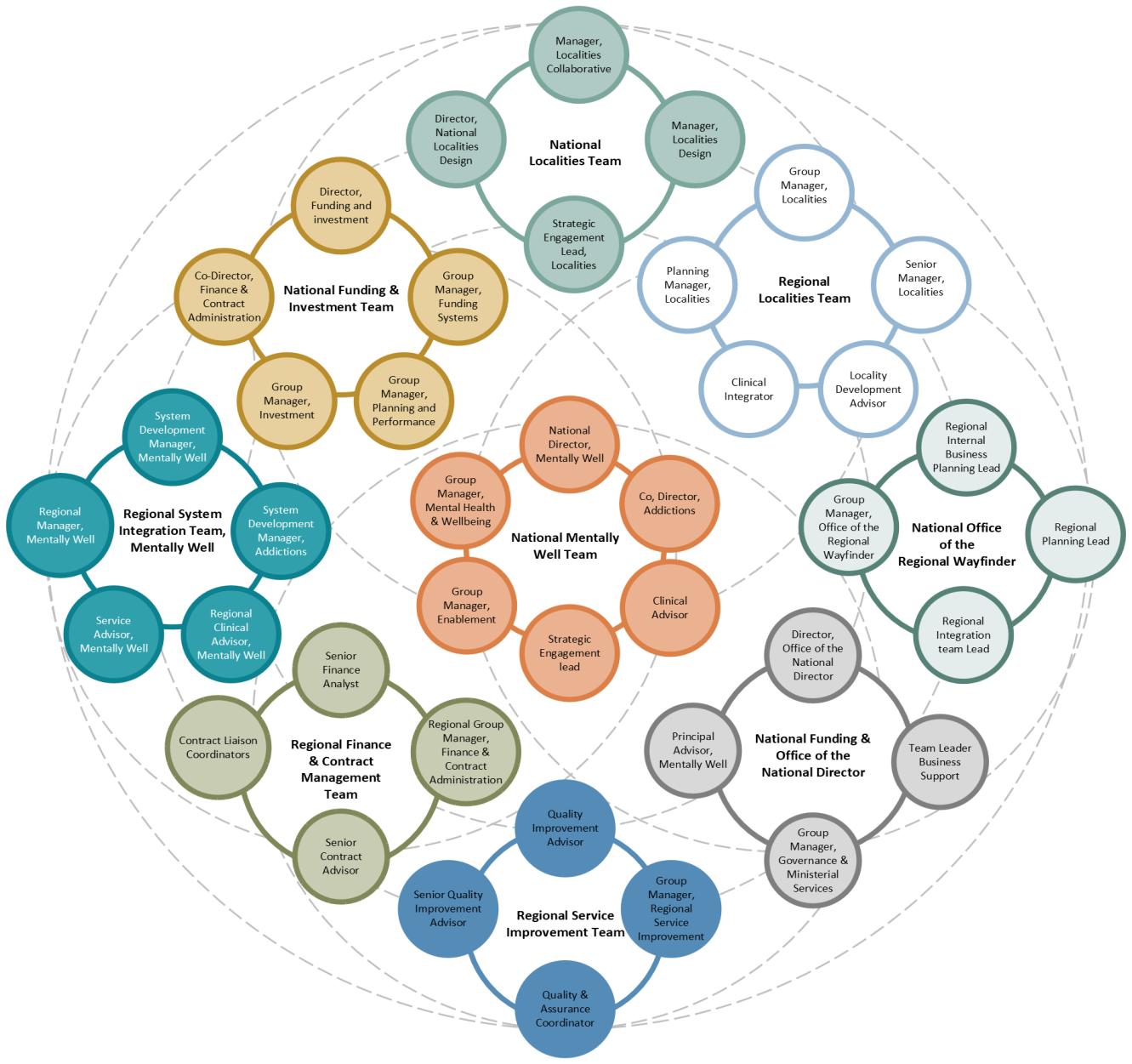
National and regional design teams work together to reimagine systems of care, supporting the Service Development Advisors and Managers, Quality Improvement Advisors, Senior Locality Managers, Locality Clinical Integrators and Locality Development Advisors to implement service and equity improvements across their regions and localities.
The national funding and investment insights teams support system and service design and prioritisation, and the regional finance and contract management team are the pou to the regional & locality teams.
The diagram to the right illustrates this with the Mentally Well life course as an example.


The System Design team is the home of the system architects and is led by the Deputy National Director, Commissioning & System Design. The teams are responsible for leading the work to reimagine the architecture of the health system and to make sure that nationally contracted health services are robust, efficient and responsive to the wellbeing aspirations of communities and whānau The System Design team will also help coordinate and provide a national understanding of key service areas, building off the information and advice of localities and regions Improving Māori health outcomes and addressing equity gaps will be a particular expectation of the work of the team
These are critical planning functions enabled by a strong partnership with Te Aka Whai Ora, as well as the other Delivery teams within Te Whatu Ora. These are nationally based functions that serve the regions and localities with a range of content experts (from clinicians, consumers, Iwi, sector experts, etc) that design nationally consistent systems of care across key life course areas. This group is responsible for working with Manatū Hauora to establish long-term blueprints for the transformation of these systems of care, largely implemented at the regional and local level through the Wayfinders and integration teams The System Design team also supports regional clinical services planning through their system design expertise
Procurement and contracting of health services will primarily sit with regional and local Wayfinders except where national agreements are required, with the System Design Teams developing the new service and funding arrangements for national agreements, as well as providing guidance such as nationally consistent service requirements and funding approaches where these are required. The System Design Team comprises five teams who oversee the system design function across the life course (Starting Well, Living Well including Rural Health, Mentally Well & Addictions and Ageing Well) along with Localities Design.
There was significant feedback on the lack of visibility of key equity roles, and in particular equity roles supporting our commissioning strategy for disabled persons The final structure has equity roles across the system design team, with a new Chief Advisor for Disabled People role reporting to the Deputy National Director (and an associated Principal Advisor, Disabled People role also created). The leadership for Te Whatu Ora’s strategy to meet the needs of disabled persons will continue to remain in the Office of the Chief Executive as originally proposed.

Director,
Co-Director,
Co-Director, Addictions











 Deputy National Director, Commissioning & System Design
Starting Well Director, Living Well
Rural Health
Director, Ageing Well Director, Mentally Well
Director, Localities Design
Executive Assistant to Deputy National Director Chief Advisor, Disabled People Commissioning
Principal Advisor, Disabled People
Deputy National Director, Commissioning & System Design
Starting Well Director, Living Well
Rural Health
Director, Ageing Well Director, Mentally Well
Director, Localities Design
Executive Assistant to Deputy National Director Chief Advisor, Disabled People Commissioning
Principal Advisor, Disabled People
There was overwhelming feedback across the submissions that the sizes of the System Design Teams were light, particularly given the large amount of work that currently occupies the teams with ministerial and governance servicing, and management of day-to-day media enquiries Some of the teams described this work as the predominance of their work programme, and others noted it was a significant portion of their function
The predominant Life Course team that was identified as light from an FTE and work programme perspective was the Starting Well Team (particularly maternity, well child, and population health) who undertake a large amount of sector-facing work, oversee a significant number of agreements, and hold large responsibilities against Te Pae Tata.
Much of the feedback also centred on the lack of clarity of where programmes or subject matter expertise would be based in teams, and the need for better formation of teams to oversee programmes of work. There was a theme around establishing a ‘Staying Well’ Team, however this was ultimately discounted given our desire to stay within a life course framework and that ‘staying well’ are components across all teams (e g Mentally Well and Ageing Well have strong staying well components)
The final proposal for the System Design Team shows an increase in particular in the Starting Well Team, with more specificity in roles, the removal of programme managers as a generic role across teams, and more administrative support across all life course teams. The changes also need to be understood alongside the significant increase in advisors supporting Ministerial servicing in the Office of the National Director (and two roles in each of the Offices of the Regional Wayfinder).
With the establishment of the Strategic Design Networks as part of Te Pae Tata, four Strategic Network Programmes Managers have also been established for each Life Course Team The final structure also identifies specific roles to support the Whaikaha programme of work for Commissioning (with the central leadership for this sitting as a Direct Report to the Deputy Director), a Rainbow System Design role, and the specific Budget programme roles (GAPC and HIV Action).

Much of the general feedback on the Starting Well Function related to the significant reduction in FTE from current teams, and the lack of clarity and visibility of key areas such as maternity, women’s health, child health, long term conditions, STBBI work, housing, heathy families Other primary feedback was the lack of administrative support across teams
• The team size has changed from 40 proposed roles to 48 5 proposal roles (excludes Budget-specific roles like HIV Action and GPAC as these are Budget-funded), with the reproductive health portfolio shifted to Living Well.
• A Chief Advisor, Whaikaha reporting to the Deputy Director, Commissioning and System Design has been established with a Principal Advisor supporting the function. This represents two new roles within the Structure.

• The Starting Well Team management structure has reduced from four to three Group Managers
• Programme managers are now no longer a feature of the team composition, with Service Development Managers and Advisors holding this function as part of their role
• A Principal Advisor, Starting Well has been established in the Office of the National Director to support and manage ministerial servicing requirements related to Starting Well
• Clinical Advisors are now included across teams and there are more of them
• Additional administrative support has been established across teams.
• The Strategic Engagement lead for Starting Well is now embedded in the team (and will work in a matrix across other Strategic Engagement leads)
• While sexual health remains within the Starting Well team, Reproductive Health responsibilities have shifted to the Living Well team
• There are several programmes of work that have also shifted to NPHS, including alcohol, food and nutrition and physical activity contracts, sexual health promotion and the 2025 smokefree programme.
A direct comparison of the team size and function from the proposal to the final structure is difficult, given the reshuffle of some portfolios across this team (including shifting some functions to NPHS) and the doubling of the ministerial servicing team within the Office of the National Director (and the specific portfolio around Starting Well in that Office).
Director, Starting Well
Strategic Network Programme Manager, Starting Well
Executive Assistant to Director, Starting Well
Strategic Engagement Lead, Starting Well
Group Manager, Population Health
Clinical Advisor (0.5 FTE x 2)
Executive Assistant to GM Pop Health & Young People
Group Manager, Young People
Clinical Advisor (0.5 FTE)
System Design Manager, Maternity
Principal Service Development Manager, Maternity
Senior Service Development Manager, Maternity (2)
Service Development Advisor, Maternity
Clinical Advisor, Maternity (0.5)
Team Administrator
System Design Manager, Early years
Principal Service Development Manager, Early years
Senior Service Development Manager, Early years (2)
Service Development Advisor, Early years
Clinical Advisor, Early years (0.5)
Manager, Whānau Wellbeing

System Design Manager, Whānau Wellbeing

Principal Service Development Manager, Housing
Principal Service Development Manager, Family violence
Principal Service Development Manager
Rheumatic Fever
Senior Service Development Manager, Whānau Wellbeing
Service Development Advisor, Whānau Wellbeing
Team Administrator
Manager, Community Wellbeing & Harm Reduction
Principal Service Development Manager, Long Term Conditions
Principle Service Development Manager, Healthy Families
Senior Service Development Manager, Community Wellbeing
Service Development Advisor, Community Wellbeing (2)
Principal Service Development Manager, Sexual Health
Senior Service Development Manager, Harm Reduction
Service Development Advisor, Harm Reduction
Programme Manager, STBBI

























System Design Manager, Youth Health
System Design Manager, Oral Health
System Design Manager, Rainbow Health
Senior Service Development Manager, Young People
Senior Service Development Manager, Oral Health
Service Development Advisor, Young People Service Development Advisor, Oral Health
Team Administrator
Programme Manager, GAPC
Group Manager, Kahu Taurima Executive Assistant to GM Kahu Taurima Strategic Advisor, Kahu TaurimaMuch of the general feedback on the Living Well Function was related to lack of clarity on the team’s responsibilities, and the lack of visibility of key areas such as refugee health, pharmacy, telehealth, and rainbow health (now incorporated in the Young People team in Starting Well – refer above). Other primary feedback was the lack of administrative support and Clinical Advisor roles across teams. There was considerable feedback also on the ambulance team size and functions with respect to their significant work programme, as well as the need for a more strategic approach to the function of ambulance within the wider eco-system of planned and unplanned care. Finally, we addressed the feedback around the Team supporting assisted dying and abortion services (originally the Choices team) by working with the Team directly to design the best option for configuring the team.

• The team size has changed from 56.5 proposed roles to 53 proposed roles (excludes the Choices Team which are a directly reconfirmed team from Manatū Hauora).

• The Living Well Team management structure has reduced from six to five Group Managers (the roles previously under the GM, Dying Well are now reporting to the Group Manager, Planned Care)
• Programme managers are now no longer a feature of the team , with Service Development Managers holding this function as part of their role.
• Women’s Health, Telehealth, Refugee Health and Reproductive Health responsibilities have shifted to the Living Well team.
• Additional Clinical Advisors have been added are now included across teams.
• The Strategic Engagement lead for Living Well is now embedded in the team (and will work in a matrix across other Strategic Engagement leads)
• The ambulance team has been split across two teams, with additional roles created. The Managers will be required to hold a strategic programme of work on top of their people leader responsibilities.
• A Strategic Network Programme Manager has been created
• Additional administrative support has been established across teams.
A direct comparison of the team size and function from the proposal to the final structure is difficult, given the reshuffle of some portfolios across this team (including shifting some functions to NPHS) and the doubling of the ministerial servicing team within the Office of the National Director (and the specific portfolio around Starting Well in that Office).
Executive Assistant to Director & Co-Director
Director, Living Well
Co-Director, Rural Health










System Design Manager, Integrated Rural Health
Principal Services Development Manager, Rural Health
Strategic Engagement Lead, Living Well
Strategic Network Programme Manager, Living Well
Senior Service Development Manager, Rural Health
Clinical Advisor (0.5 FTE)
System Design Manager, Rural Communities Service Development Advisor, Rural Health Team Administrator
Group Manager, Planned Care
Group Manager, Primary Care Manager, Unplanned Care Group Manager, Ambulance Manager, Autonomy Team
Director, Living Well
Executive Assistant
Strategic Network Programme Manager, Living Well
Group Manager, Ambulance
Group Manager, Planned Care
Co-Director, Rural Health













Manager, Unplanned Care
Executive Assistant (shared with Planned Care)
Strategic Engagement Lead, Living Well
System Design Manager, Referred Services
System Design Manager, Palliative Care
Principal Service Development Manager, Planned Care
Senior Service Development Manager, Palliative Care
Service Development Advisor, Planned Care
Clinical Advisor (0.5)
Senior Service Development Manager, Women’s Health
Team Administrator
System Design Manager, Unplanned Care

System Design Manager, Acute Flow
Principal Service Development Manager, Telehealth
Senior Service Development Manager, Unplanned Care
Clinical Advisor (0.5)
Group Manager, Primary Care
Executive Assistant
System Design Manager, Primary & Community Care
System Design Manager, Pharmacist Services
Principal Service Development Manager, Primary Care
Senior Service Development Manager, Primary Care
Service Development Advisor, Primary Care (2)
Clinical Advisor (up to 1 FTE)
Principal Service Development Manager, Reproductive Health Principal Service Development Manager, Refugee & Migrant Health
Team Administrator
Group Manager, Ambulance
Manager, Autonomy Team
Principal Clinical Advisor, Assisted Dying (3)
Team Administrator
Executive Assistant
Clinical Advisor (0.5 FTE)
See box on right
Principal Service Development Manager, Abortion Services
Senior Development Manager, Abortion Services
Team Leader, Air Ambulance
Team Leader, Road Ambulance
Team Administrator
System Design Manager, Air Ambulance
Principal Service Development Manager, Air Ambulance
Senior Service Development Manager, Air Ambulance
Service Development Advisor, Air Ambulance
Senior Business Analyst (shared with Road Ambulance)
System Design Manager, Road Ambulance
Principal Service Development Manager Road Ambulance
Senior Service Development Manager, Road Ambulance Service Development Advisor, Road Ambulance
The general feedback from submissions around Mentally Well related to the lack of visibility of key equity leads, lived experience and the sizing of teams. Furthermore, there was a view that the Co-Director, Addiction role was seen as the subordinate to the Director, Mentally Well and that it should be structured as a separate Director in the National System Design team. While this feedback has been reflected on, the final structure maintains the original proposal of a Codirector, Addictions to the Director, Mentally Well on the basis that the size of the System Design team as a set of direct reports to the Deputy Director is already substantive and addictions is an important component of Mentally Well There is also significant work that sits within the mentally well such as the national mental health services framework and workforce development activities that support additions also
There was feedback on the way in which the mental health team was arranged that implied that only the previously named ‘Integrated Health Systems’ Team took a system wide and integrated view of design and planning.
Similar to the other System Design teams, there was a consistent theme related to the significant ministerial servicing burden that the current national mental health and addictions team currently hold as part of their roles, and that while system design was a necessary part of Te Pae Tata, room for much of the business-as-usual work was also required
Finally, there was strong feedback regarding the absence of lived experience and Māori leadership roles which have been a consistent feature of mental health and addictions teams for many years now
• The team size has reduced from the 43.5 proposed roles to 43 roles, however a range of new roles have been created from the reconfiguration of the original proposed structure.
• The Mentally Well management structure has reduced from three Group Managers to two Group Managers (the roles across the previous three GMs are now split across two GMs)
• Three new Team Leaders have been established (Primary & Population Health, Infant Child & Youth, and Acute & Complex) and they will be expected to hold strategic portfolios as well as lead/support their teams.
• Generic Programme Managers are no longer a feature of the team composition, with Service Development Managers & Advisors holding this function as part of their role. The exception is the Mana Aka Programme Management role which has a specific programme of work under previous Budgets.
• Lived Experience roles have been established in both the Addictions team and the Mental Health team
• A Principal Advisor, Mentally Well has been established in the Office of the National Director to support and manage ministerial servicing requirements related to Mentally Well.
• Additional administrative support has been established across teams through an Executive Assistant to the GMs.
• The Strategic Engagement Lead for Mentally Well is now embedded in the team (and will work in a matrix across other Strategic Engagement leads).

• A Mentally Well Strategic Network Programme Manager has been established.

Director, Mentally Well
Strategic Network Programme Manager, Mentally Well
Strategic Engagement Lead, Mentally Well
Strategic Advisor, Mentally Well
Group Manager, Mental Health & Wellbeing
Team Administrator Executive Assistant
Team Leader, Primary & Population Mental Wellbeing
System Design Manager, Primary & Population Mental Wellbeing

Principal Service Development Manager, Primary & Population Mental Wellbeing (2)
Senior Service Development Manager, Primary & Population Mental Wellbeing
Service Development Advisor, Primary & Population Mental Wellbeing
Team Leader, Infant, Child & Youth
System Design Manager, Infant, Child & Youth
Senior Service Development Manager, Infant, Child & Youth
Service Development Advisor, Infant, Child & Youth
Programme Manager, Mana Ake
Executive Assistant to Director & Co-Director
Co-Director, Addictions
See box on right
Workforce Director
Director, Mentally Well
Group Manager, Enablement
Principal Advisor, Lived Experience
Co-Director, Addictions











































Clinical Advisor, Addictions (0.5)
Team Leader, Acute & Complex
System Design Manager, Acute & Complex
Principal Service Development Manager, Acute & Complex
Senior Service Development Manager, Acute & Complex
Service Development Advisor, Acute & Complex
System Design Manager, Sector Development
Principal Service Development Manager, Sector Development (2)
Senior Service Development Manager, Sector Development (2)
Service Development Advisor, Enablement
Principal Advisor, Lived Experience
Clinical Advisor (0.5 FTE)
Team Administrator
System Design Manager, Alcohol System Design Manager, Drugs

System Design Manager, Gambling Harm Principal Service Development Manager, Addictions (2)
Senior Service Development Manager, Addictions Service Development Advisor, Addictions
Team Administrator
The primary feedback on the Ageing Well proposal related to the split of the team into an aged care and home and community ageing function, which was seen as contrary to the need to consider the design of older persons services as part of a continuum of care
Addressing the Feedback on the Ageing Well Team: Summary
• The team size has changed from 16 proposed roles to 12.5 roles.
• The Ageing Well team management structure is now flat, with the removal of the two Group Managers (Aged Residential Care and Community Ageing) originally proposed.
• Programme managers are now no longer a feature of the team composition, with Service Development Managers & Advisors holding this function as part of their role.
• A Principal Advisor, Ageing Well has been established in the Office of the National Director to support and manage ministerial servicing requirements related to Ageing Well.
• The Strategic Engagement lead for Ageing Well is now embedded in the team (and will work in a matrix across other Strategic Engagement leads)
• The Clinical advisory function has reduced from 1 FTE to 0.5 FTE.
• An Ageing Well Strategic Programme Network Manager has been established

A direct comparison of the team size and function from the proposal to the final structure is difficult, given the reshuffle of some portfolios across this team and the doubling of the ministerial servicing team within the Office of the National Director (and the specific identified portfolio around Ageing Well in that office)
Group Managers The primary feedback on the Ageing Well proposal related to the split of the team into an aged care and home and community ageing function, which was seen as contrary to the need to consider older persons as a continuum of service and care.
Clinical Advisory function
In line with the clinical advisory FTE across other Teams, the Clinical Advisory function for the team has reduced from 1 FTE to 0.5 FTE.
Strategic Engagement There was feedback regarding the critical ‘path smoothing’ nature that strategic engagement leads hold around strategic stakeholder planning and delivery that was better suited to being embedded within the team they serve, rather than within the Office of the National Director as originally proposed.
Executive Assistant to Director, Ageing Well
Director, Ageing Well
Strategic Network Programme Manager, Ageing Well
Strategic Engagement Lead, Ageing Well
Team Administrator
System Design Manager, Ageing Well
















Clinical Advisors, Ageing Well (0.5)
Principal Service Development Manager, Ageing Well (3)
Senior Service Development Manager, Ageing Well (2)
Service Development Advisor, Ageing Well
• The Ageing Well team management structure is now flat, with the removal of the two Group Managers (Aged Residential Care and Community Ageing) originally proposed.
• The Clinical advisory function has reduced from 1 FTE to 0.5 FTE.
• A specific Strategic Engagement Lead for Ageing Well has been established within the Ageing Well team.
There was various feedback on the national Localities team structure and function, though much of it aligned to the proposal
There was feedback regarding the critical ‘path smoothing’ nature that strategic engagement leads hold around strategic stakeholder planning and delivery that was better suited to being embedded within the team they serve, rather than within the Office of the National Director as originally proposed. Locality Strategic Engagement leads are now a new functions embedded within the Regional Locality teams.
• The National Localities team has increased in size from seven to nine FTE, with the Strategic Engagement lead for the national Localities programme now embedded in the team (and will work in a matrix across other Strategic Engagement leads and regional Locality teams)
• A Strategic Advisor, Localities has been established which is a senior SME for both the national and regional teams, and will take the leadership for support the strategic direction and approach to localities alongside Regional Group Managers, Localities.
• Role titles are the only thing that have changed including:
o The Manager, National Localities Programme is now called the Localities Design Lead
o The Manager, Localities National Collaborative is now called Localities Collaborative Lead
o An advisor has been replaced with a Principal Advisor reporting to the Localities Design
Strategic Advisor, Localities
Director, National Localities Design
Team Administrator
Strategic Engagement Lead, National Localities

Programme Manager, Localities Design









Senior Advisor, Localities Design
Advisor, Localities Design
Programme Manager, Localities Collaborative Principal Advisor, Localities Collaborative

The Funding and Investment team has seen the most significant changes from the original proposal. There was considerable feedback generally on the analytical functions both at a national and regional level – primarily around the lack of analytical capacity for commissioning and the distribution of that capacity across teams
From a regional perspective, there was concern that two of the regions did not have any dedicated resource as part of their teams From a national perspective, it was identified that the analytical functions could be better arranged across more specific functional groupings of expertise and centralised further Centralising the analytical function would promote collaboration across the different types of analysts, enabling analysts to maintain career growth and develop their expertise to specialize helping to retain analysts and reduce duplication of effort
As a result, we have centralised the analytical functions within the Funding and Investment team and created a core group of analysts who can support national, regional and local level requirements across a large skill mix We have arranged the functions in the following way: Investment, and Planning and Performance A strategic Advisor to the Director and the teams has been established to provide the strategic thought leadership to the team on insights, evidence and performance
The investment function is now centralised under a Group Manager, Investment with Investment analysts previously placed in regional teams absorbed into the national function. The investment function will need to work closely with the Commissioning Finance Function which is now proposed to sit within the commissioning team with a national and regional structure to support funder financial management. Investment analytics functions support a strategic investment view of commissioning and include:
• Provides technical expertise to Commissioning teams to assist in understanding their investment profiles.
• Develops new funding and investment models that address key equity gaps

• Provides expert advice on planning and allocation of the Commissioning budget
• Works alongside regional and national commissioning teams to identify risks and opportunities within the current investment mix
• Works with other analytical teams to combine data sources and provide insight into overall value for money of existing investments.
• Develops long term investment strategies considering how best to distribute and allocate Commissioning resources.
The Health Insights function is now centralised in a planning and performance team split into three separate reporting lines:
• Manager, Service Modelling which will focus on predictive and prescriptive modelling.
• Manager, Health Insights Planning which will focus on place-based analysis including specialisation in geospatial analysis.

• Manager, System Performance which will focus on regional support and reporting.
Health Insights function:
• Redefines analysts as commissioners with specialist skills in analytics and insights
• Provides descriptive analytics on the people we serve and where they live for service planning purposes to understand current state, health need and determine future state
• Provides diagnostic analytics that measure equity of access and outcomes to address unwarranted variation and assessing pro-equity performance providing a system-wide view of equity issues
• Develops new provider reporting frameworks co-designed with stakeholders that fit future service delivery models.
• Maintains ongoing operational reporting requirements.
• Ensures reporting requirements are met for day-to-day operations.
• Monitors health system to ensure performance is in line with expected quality standards and desired outcomes.
• Develops key performance dashboards of operational performance for the national and regional teams and tracking key system performance indicators in partnership with SI&I.
Regions will continue to have dedicated analytical resource The Manager, System Performance will maintain a dotted reporting line to the Regional Wayfinders to ensure each region has an initial point of contact for their analytical support while ensuring analysts can tap into the other teams to provide additional and specialist analytical resource when required
Strategic Advisor, Insights, Evidence & Performance
Group Manager, Investment
Executive Assistant to GMs Team Administrator (2)
Executive Assistant Executive Assistant
Group Manager, Funding Systems Manager, National Contracting & Procurement Principal Advisor, Contracting Systems & Processes Senior Contract Liaison Manager Contract Liaison Coordinator (2) Principal Advisor, Procurement
Manager, Funded Sector Employment Relations
Principal Service Development Manager, Funded Sector (2)
Senior Services Development Manager, Funded Sector Programme Manager, Funded Sector Principal Technical Specialist
Head of Reporting, Costing & Standards (Finance Team)
National Lead, Finance & Contracting
National Lead, Finance & Contracting Regional Group Manager, Finance & Contracting
Northern Regional Group Manager, Finance and Contracts
Te Manawa Taki Regional Group Manager, Finance and Contracts

Central Regional Group Manager, Finance and Contracts
Te Wai Pounamu Regional Group Manager, Finance and Contracts

National Finance functions and roles to be determined in Phase 2 of Finance Process
Regional Finance functions and roles to be determined in Phase 2 of Finance Process
Regional Manager, Contract Liaison & Procurement Senior Contract Manager (2) Contract Liaison Coordinator (5)
Senior Advisor, Procurement (2)




























































Director, Office of the National Director, Commissioning
There was consistent feedback across all the national teams regarding the significant burden that each of the current national teams hold around ministerial servicing including briefings, correspondence, and Parliamentary Questions as well as servicing of Official Information Act Requests and broader sector correspondence Some teams identified that this sometimes overrode the important system and service design requirements of their functions, as well as supporting the broader sector relationships required to drive change.
As a result, the governance and ministerial servicing component within the Office of the National Director has been significantly boosted Some of the more senior roles (Principal Advisors) also hold a specific Life Course Area portfolio and will be the key conduit, subject matter expert and pen holder across this work with other advisors in the team. They will work in close collaboration with the Strategic Engagement Leads and Directors within the Life Course teams.
Feedback was also received around the importance of embedding the Strategic Engagement roles within the subject matter team they support. The Strategic Engagement leads previously within the National Office of the Director are now embedded into their relevant Life Course Teams (and Localities), and will need to work in a matrix way as a Strategic Engagement team to ensure monitoring, support and consistent practices across each other.
The size of the team under the Office of the National Director, Commissioning has increased from 17 to 20. Comparisons in FTE from the initial proposal to the final document are difficult as the Strategic Engagement roles previously under the office have now shifted into their Life Course teams
Executive Assistant to National Director, Commissioning
Executive Assistant to Director, Office of the National Director

Group Manager, Governance & Ministerial Services
Principal Advisor, Starting Well

Principal Advisor, Mentally Well
Principal Advisor, Living Well
Principal Advisor, Ageing Well
Principal Advisor, Localities



















Senior Advisor, Governance & Ministerial Services (2)
Advisor, Governance & Ministerial Services (3)
Team Leader, Business Support Principal Advisor, Quality & Risk
Principal Advisor, Internal Business Planning & Reporting
Advisor, Business Support
Team Administrator
Team Administrator
The total number of ‘pure’ commissioning roles across the Regional teams is 107 roles per region. This excludes the bespoke arrangements across the regions for roles that are either clinical delivery roles, or those that are funded via the Funder Budget.
The final regional structure has a different configuration of teams reporting to the Regional Wayfinder, with two proposed teams (the proposed Regional Investment team and the Regional Planning team) now disbanded and their functions embedded across both other regional and national teams.
Key changes resulting from the disbandment of these two teams are:
• Regional Contract Management functions are now embedded in a newly proposed Finance and Contracts team (with the Group Manager for that team holding a direct reporting line to a National Lead, Finance & Contracting in the national Funding and Investment team and a dotted reporting line to the Regional Wayfinder).
• Regional analytical functions are now centralised within a national team (though will have some dotted line linkages back to the Regions)
• Regional Performance and Monitoring functions are shifted to Office of the Regional Wayfinder though will have a strong interface with the national analytical team who hold that function also.
• The Regional Planning function is now incorporated into the Office of the Regional Wayfinder.
• The Locality Planning function is now incorporated into the Localities team
• The Chief Advisor role is no longer a feature of the final regional structure.
• Therefore, the Regional Wayfinder will have four Group Managers and a Regional Clinical Director, Primary and Community Care in their Senior Leadership team They also have a Regional team of Finance and contract administration functions supporting them with a dotted reporting line to them, and a formal reporting line to the National Lead, Finance & Contracting. The Northern region Wayfinder will also have an additional Delivery team via a Group Manager, Northern Region Community Delivery team
Te Wai Pounamu will have the South Canterbury PHO Delivery team reporting to the Group Manager, Regional System Integration.
National Lead, Finance & Contracting
Regional Wayfinder

Regional Group Manager, Finance & Contracting
Group Manager, Regional System Integration South Canterbury PHO Delivery Manager

Group Manager, Regional Service Improvement Group Manager, Localities
Executive Assistant to Regional Wayfinder Regional Clinical Director, Primary & Community Care
Group Manager, Office of the Regional Wayfinder



















Group Manager, Northern Region, Community Delivery Various teams of clinical service delivery


The Office of the Regional Wayfinder (Regional Office) is proposed to be the central coordination point for the regional commissioning functions. The team will work closely with the Office of the National Director, Commissioning to ensure consistent systems and practices across the regional business including internal business planning and risk management processes. The team will also support the National Office of the Director, Commissioning with any regional requirements around Government and Ministerial processes such as OIAs, PQs, Briefings, and reports. The team size has remained at 16 but the functions and roles have changed from the proposal.
The Regional Office will also administer key operational processes such the region’s emergency preparedness through the Business Continuity Manager.
It will also provide the secretariat function for the Regional Integration Team (RIT) which the Regional Wayfinder will co-chair alongside the Regional Director for Te Aka Whai Ora. The four Regional Integration Teams will operate in line with the national service delivery leads’ expectations to ensure vertical and horizontal integration across all services within a region and deliver a nationally consistent regional work programme.

The Regional Planning function is now incorporated into this team, as well as the Monitoring and Reporting functions previously proposed in a separate planning team. A detailed summary of the changes are summarised next.
Key functions of the Office of the Regional Wayfinder team include:
• Secretariat for Regional Integration Teams
• Coordinating and supporting regional input into the development of annual business plans, reports, briefings, etc
• Implementing consistent group-wide processes, procedures, tools, and templates at a regional level
• Implementing the risk management practices developed by the national office across the team
• Interface with NGOs and the national office on business continuity
• Regional planning
Principal

















Principal Advisor, RIT Coordinator, RIT Strategic Engagement Lead, RIT
 Group Manager Office of the Regional Wayfinder
Regional Integration Team Lead Programme Manager, RIT
Regional Internal Business Planning Lead Principal Advisor, Government & Ministerial Services
Advisor, Quality & Risk Principal Advisor, Monitoring & Reporting Advisor, Government & Ministerial Services
Regional Planning Lead Senior Advisor, Regional Planning
Business Continuity Manager
Executive Assistant Team Administrator
Group Manager Office of the Regional Wayfinder
Regional Integration Team Lead Programme Manager, RIT
Regional Internal Business Planning Lead Principal Advisor, Government & Ministerial Services
Advisor, Quality & Risk Principal Advisor, Monitoring & Reporting Advisor, Government & Ministerial Services
Regional Planning Lead Senior Advisor, Regional Planning
Business Continuity Manager
Executive Assistant Team Administrator
The Regional System Integration team is proposed to be made up of subject matter experts, system design thinkers and change leads, contract and relationship managers, and clinical advisors who will lead system integration across regions and localities. The team is designed to support the Senior Locality Managers to navigate complex service issues across providers and localities and work with the regional system improvement team to address key issues of service quality, supporting key integration and change programmes of work Improving Māori health outcomes and addressing equity gaps will be a particular expectation of the work of the team
This team is intended to hold strategic service development relationships with providers across localities and/or regions where appropriate including ensuring localities are well-supported by integrated networks of providers aligned to support priorities identified in locality plans The team is also intended to work in matrix with the national system design team to support the development and implementation of key integrative models of care, working closely as part of the Regional Integration team across Te Whatu Ora and Te Aka Whai Ora to drive new models of care as identified in regional clinical services plans. The team will also provide input into regional and locality health planning processes – a key deliverable of the regions.
The key functions of the Regional System Integration team include:
• Lead the procurement and provider relationship management of funded services

• Lead regional system and service re-design across the life span in partnership with national and other regional teams

• Lead implementation of integration change programmes
• Lead sector-facing engagements across the NGO funded sector
• Support the management of key operational issues that occur across a network of providers across a region and/or a locality
• Holding key relationships with sector leaders across the region and localities
• Act as the Pou to Senior Locality Managers
There was general confusion of the role and function of the Regional System Integration team, in part due to the proposal not identifying the specific portfolios or areas of expertise the roles and team would carry, the naming convention for the roles of Principal Advisor in a regional commissioning function, and the interface between the function of the team with the Locality teams
There was also feedback that the regional teams tasked with service development and monitoring, managing provider contracts and relationships, as well as broader sector relationships across their regions, were too light This was particularly so given their dual function of also leading or supporting system and service improvements, including the integrative programme of work for the region.
There was also feedback that the clinical advisory function was light given the system integration functions, and that the administrative support to manage a team of 50 plus FTE was too light
As a result, some of the proposed roles like Programme Manager have been replaced with Service Development Managers & Advisors who will hold programmes of work as required Additional FTE have also been added into some of the life course areas to enable the design and implementation of services, the response to operational issues as they arise across life course areas, and the management of contracts and provider/sector relationships.
An additional 16 FTE Clinical Advisory have been added across regional teams, and in many cases, these will be part time across life course areas. This will enable in some cases for two advisors with different expertise or professional backgrounds to cover off a subject matter area (e.g. for Mentally Well, an addictions specialist and a mental health expert might make up the clinical advisory function).
Additional Administrative support has also been added across life course teams. The total FTE for regional teams has increased by 8.
Group Manager, Regional System Integration, Northern Region
Executive Assistant
Regional Manager, Starting Well
Regional Manager, Living Well
Regional Manager, Ageing Well
Regional Manager, Mentally Well
Regional Manager, Rural Health
Executive Assistant (shared with RM, Living Well)
System Design Manager, Kahu Taurima

System Design Manager, Maternity
Principal Service Development Manager, Starting Well (2)
Senior Service Development Manager, Starting Well
Clinical Advisor, Starting Well (up to 1 FTE)
Team Administrator
System Design Manager, Referred Services
System Design Manager, Primary & Community Health Services
Principal Service Development Manager, Living Well (2)
Senior Service Development Manager, Living Well
Service Development Advisor, Living Well
Clinical Advisor, Living Well (up to 1 FTE)
Senior Service Development Manager, Refugee & Migrant Health
Executive Assistant (shared with RM, Mentally Well)
System Design Manager, Ageing Well
Principal Service Development Manager, Ageing Well (2)
Senior Service Development Manager, Ageing Well (2)
Service Development Advisor, Ageing Well (2)
Clinical Advisor, Ageing Well (0.5 FTE)
Team Administrator (Shared with Rural Team)
System Design Manager, Mentally Well
System Design Manager, Addictions



















Principal Service Development Manager, Mentally Well (2)
Senior Service Development Manager, Mentally Well
Service Development Advisor, Mentally Well
Clinical Advisor, Mentally Well & Addictions (up to 1 FTE)
System Design Manager, Rural Health
Principal Services Development Manager, Rural Health
Senior Services Development Manager, Rural Health
Clinical Advisor, Rural Health (0.5 FTE)
SUDI Prevention Programme Manager (Auckland) Hep C Programme Manager

Team Administrator
Team Administrator
Hep C Coordinator (0.5 FTE)
Programme Manager, MH&A Transformation (2)
Mana Ake Programme Roles (6)
Executive Assistant
Group Manager, Regional System Integration, Te Manawa Taki Region

Regional Manager, Starting Well
Regional Manager, Living Well
Regional Manager, Ageing Well
Regional Manager, Mentally Well
Regional Manager, Rural Health
Executive Assistant (shared with RM, Living Well)
System Design Manager, Kahu Taurima

System Design Manager, Maternity
Principal Service Development Manager, Starting Well (2)
Senior Service Development Manager, Starting Well
Clinical Advisor, Starting Well (up to 1 FTE)
System Design Manager, Referred Services
System Design Manager, Primary & Community Health Services
Principal Service Development Manager, Living Well (2)
Senior Service Development Manager, Living Well
Service Development Advisor, Living Well
Clinical Advisor, Living Well (up to 1 FTE)
Team Administrator
SUDI Prevention Programme Manager (Tairawhiti)
Senior Service Development Manager, Refugee & Migrant Health
Team Administrator
Hep C Programme Manager
Executive Assistant (shared with RM, Mentally Well)
System Design Manager, Ageing Well
Principal Service Development Manager, Ageing Well (2)
Senior Service Development Manager, Ageing Well (2)
Service Development Advisor, Ageing Well (2)
Clinical Advisor, Ageing Well (0.5 FTE)
Team Administrator (Shared with Rural Team)
Suicide Prevention/Postvention Coordinator (2)
Programme Manager, MH&A Transformation (2)
Kia Ora Ake Programme Lead (2)
Suicide Prevention Advisor






















System Design Manager, Mentally Well
System Design Manager, Addictions
Principal Service Development Manager, Mentally Well (2)
Senior Service Development Manager, Mentally Well
System Design Manager, Rural Health
Principal Service Development Manager, Rural Health
Senior Service Development Manager, Rural Health
Clinical Advisor, Rural Health (0.5 FTE)
Suicide Pre/Postvention Coordinator
Service Development Advisor, Mentally Well
Team Administrator
Clinical Advisor, Mentally Well & Addictions (up to 1 FTE)
Executive Assistant
Group Manager, Regional System Integration, Central Region
Regional Manager, Starting Well
Regional Manager, Living Well
Regional Manager, Ageing Well
Regional Manager, Mentally Well
Regional Manager, Rural Health
Executive Assistant (shared with RM, Living Well)
System Design Manager, Kahu Taurima


System Design Manager, Maternity
Principal Service Development Manager, Starting Well (2)
Senior Service Development Manager, Starting Well
Clinical Advisor, Starting Well (up to 1 FTE)
Team Administrator
System Design Manager, Referred Services
System Design Manager, Primary & Community Health Services
Principal Service Development Manager, Living Well (2)
Senior Service Development Manager, Living Well
Service Development Advisor, Living Well
Clinical Advisor, Living Well (up to 1 FTE)
Senior Service Development Manager, Refugee & Migrant Health Team Administrator
Executive Assistant (shared with RM, Mentally Well)
System Design Manager, Ageing Well
Principal Service Development Manager, Ageing Well (2)
Senior Service Development Manager, Ageing Well (2)
Service Development Advisor, Ageing Well (2)
Clinical Advisor, Ageing Well (0.5 FTE)
Team Administrator (Shared with Rural Team)
System Design Manager, Mentally Well
System Design Manager, Addictions



















Principal Service Development Manager, Mentally Well (2)
Senior Service Development Manager, Mentally Well
Service Development Advisor, Mentally Well
Clinical Advisor, Mentally Well & Addictions (up to 1 FTE)
Team Administrator
Programme Manager, MH&A Transformation (2)
System Design Manager, Rural Health
Principal Service Development Manager, Rural Health
Senior Service Development Manager, Rural Health
Clinical Advisor, Rural Health (0.5 FTE)
Executive Assistant
Group Manager, Regional System Integration, Te Wai Pounamu Region

Regional Manager, Starting Well
Regional Manager, Living Well
Regional Manager, Ageing Well
Regional Manager, Mentally Well
Regional Manager, Rural Health
Executive Assistant (shared with RM, Living Well)
System Design Manager, Kahu Taurima

System Design Manager, Maternity
Principal Service Development Manager, Starting Well (2)
Senior Service Development Manager, Starting Well
Clinical Advisor, Starting Well (up to 1 FTE)
Team Administrator
System Design Manager, Referred Services
System Design Manager, Primary & Community Health Services
Principal Service Development Manager, Living Well (2)
Senior Service Development Manager, Living Well
Service Development Advisor, Living Well
Clinical Advisor, Living Well (up to 1 FTE)
Senior Service Development Manager, Refugee & Migrant Health
Team Administrator
Executive Assistant (shared with RM, Mentally Well)
System Design Manager, Ageing Well
Principal Service Development Manager, Ageing Well (2)
Senior Service Development Manager, Ageing Well (2)
Service Development Advisor, Ageing Well (2)
Clinical Advisor, Ageing Well (0.5 FTE)
Team Administrator (Shared with Rural Team)
System Design Manager, Mentally Well
System Design Manager, Addictions

















Principal Service Development Manager, Mentally Well (2)
Senior Service Development Manager, Mentally Well
Service Development Advisor, Mentally Well
Clinical Advisor, Mentally Well & Addictions (up to 1 FTE)
Team Administrator
Programme Manager, MH&A Transformation (2)
Suicide Prevention & Post Vention
System Design Manager, Rural Health
Principal Service Development Manager, Rural Health
Senior Service Development Manager, Rural Health
Clinical Advisor, Rural Health (0.5 FTE)
The Regional Service Improvement team is responsible for the clinical and quality assurance of funded services. The team is made up of clinical leads and quality assurance and improvement experts to support the effective management of key quality issues across NGOs and other services across the region and localities. The Regional Clinical Director of Primary and Community Care will support this function.
The team also has oversight of the complaints management process for funded services and supports those services to address key issues of quality. They will work with SI&I and the national business support team to develop robust complaints management processes.
The key set of issues identified around the function of quality improvement was that the scope and breadth of the function was significant and could not be covered by the proposed four FTE
Much of the feedback included:
• the large number of providers to support (e.g. in Northern region there are over 220 facilities that would need support and oversight)
• the scope of function in needing a focus on both quality assurance (which is the current scope of many ex- DHB functions) and quality improvement functions was a stretch within the proposed four FTE
• the administration related to that including complaints management
As a result, the size of the Service Improvement team has increased from six to 11 roles. Key functions of the team now include:
• Manage the register of complaints and compliments, including supporting Senior Locality Managers and Service Development Managers/Advisors to address complaints
• Coordinate provider-related audits, providing information for auditors, obtaining reports and summarising information









• Responsibility for the oversight and management of provider audits, including the reporting and follow up of corrective actions with providers
• Develop and implement a quality assurance and improvement programme of work for services within the portfolio across the region
• Implement Advanced Care Planning improvement programmes across sector
The full summary of the final shape of this team is summarised next. The regional teams are different with respect to the well child improvement roles that have been reconfirmed as part of Budget funded roles in Te Wai Pounamu and Central region.

 Northern Region Group Manager, Regional Service Improvement
Team Administrator
Senior Quality Improvement Advisor
Quality Improvement Advisor, Ageing Well (2)
Quality Improvement Advisor, MH&A Quality Improvement Advisor, Primary & Community Care
Quality & Assurance Coordinator (2)
Quality Improvement Advisor, Advanced Care Planning
Executive Assistant
Northern Region Group Manager, Regional Service Improvement
Team Administrator
Senior Quality Improvement Advisor
Quality Improvement Advisor, Ageing Well (2)
Quality Improvement Advisor, MH&A Quality Improvement Advisor, Primary & Community Care
Quality & Assurance Coordinator (2)
Quality Improvement Advisor, Advanced Care Planning
Executive Assistant

Executive Assistant
Senior Quality Improvement Advisor
Executive Assistant
Senior Quality Improvement Advisor
Quality Improvement Advisor, Ageing Well (2)
Quality Improvement Advisor, Ageing Well (2)
Quality Improvement Advisor, MH&A
Quality Improvement Advisor, Primary & Community Care
Central Region Group Manager, Regional Service Improvement
Quality Improvement Advisor, MH&A
Quality Improvement Advisor, Primary & Community Care
Quality & Assurance Coordinator (2)

Quality Improvement Advisor, Advanced Care Planning
Team Administrator
Quality Improvement Advisor, Child Quality & Assurance Coordinator (2) Quality Improvement Advisor, Advanced Care Planning
Team Administrator




















 Te Manawa Taki Group Manager, Regional Service Improvement
Te Manawa Taki Group Manager, Regional Service Improvement












This team will have dual responsibility for establishing and maintaining localities across the region, as well as holding the critical contract management and relationships with funded health providers across the regions Maintaining strong relationships across communities, IMPBs, Pacific Health, NPHS, local government and other NGOs will also be a key function of this team
The Localities team will work closely with the Regional System Integration team and the Regional Service Improvement team who will hold the service subject matter experts, quality improvement experts, and change management experts to support the development of new models of service and care, management of key service risk issues, as well as drive the integration programme of work across the system
Key functions include:
• Establishing and supporting localities and locality partnership groups
• Supporting the development of locality plans
• Building relationships and working with communities, IMPBs and intersectoral partners

• Directing the procurement of services, managing contract and provider relationships
• Supporting the integration and connection of services across localities.
A large part of the feedback on localities was the sizing of the locality teams given their substantive role and function in Pae Ora. There was general confusion about the role and scope of the Senior Locality Managers as relationship holders within a locality, and whether a single person across multiple localities could undertake this work. The case studies helped to clarify that the Senior Locality Manager is a senior relationship manager with budget-holding responsibilities who holds generalist commissioning knowledge across life course areas. They will be strongly supported by the Regional System Integration teams who will hold the more specialised subject matter expertise and provider/sector relationships.
There was also feedback around the lack of local clinical relationships to enable clinical integration across providers. As a result, we have created 16 new Locality Clinical Integration FTE (four FTE per region). These are GPs or Nurse Practitioners tasked with driving system integration across primarily HSS services and providers within the localities they serve. These roles don’t replace the GP liaison roles, most of which will remain in HSS to continue the current range of activities undertaken.
As a result, the Localities team has increased from 14 to 22 roles per region and is now reconfigured as a more comprehensive team with the locality planning function now moving from a Regional Planning team into the Regional Locality team, and the establishment of the locality clinical integration roles.
Executive Assistant to GM
Team Administrator (2)








Senior Locality Manager (6) (total 16 FTE)
Localities Planning Manager

Locality Development Advisor (6)
Locality Clinical Integrators (4) (up to 4 FTE per region)
Group Manager, Localities Strategic Engagement Lead, Localities










With the disestablishment of the Regional Investment team (and the proposed establishment of a fully embedded Finance function within Commissioning at a national and regional level), the functions of procurement, contract liaison and administration are proposed to be shifted into the newly formed Finance and Contracting team The team will be a regional team reporting to a Regional Group Manager, Funding and Finance (who will hold a dotted reporting line to the Regional Wayfinder and a formal reporting line to the National Lead, Finance & Contracting) This role (and the associated teams under these roles) will be expected to be regionally based, and work closely with the Regional Wayfinder and Regional Integration team.
The main feedback from the submissions was the poor sizing of the contract administration, liaison and coordination function across regions that is critical to the smooth running of contract management. With over 10,000 contracts in place across the country on short term renewals with variable contract management systems, the administrative burden on current teams is high. While HSAPP will over time revolutionise the way in which contracts are developed and administered, this functionality is two or more years away The teams also heavily support Te Aka Whai Ora and will continue to do so in the transition for at least 12 months
There was also feedback around the lack of seniority across the contract liaison function, with more senior roles able to pick up more of the agreement generation and development (including the development of service specifications).
As a result of the feedback, the size of the teams supporting contract liaison and administration has increased from the proposed five to 10 roles, extending to a Regional Manager, two senior contract liaison managers, five Contract Liaison Coordinators, a Senior Procurement Advisor, and a Team Administrator.
 National Lead, Finance & Contracting
National Lead, Finance & Contracting

It is proposed that four new roles are established to service the operational delivery of historic services across Auckland metropolitan areas. No changes to current teams have been made. The services covered under this Team include the Mangere Refugee Centre for instance
There are a number of people currently managing PHO services in the district of South Canterbury. Most of these staff will be reconfirmed into their roles, with the exception of the smokefree roles that will shift to NPHS. The bespoke structure for this team in the Southern region is therefore depicted below
Group Manager, Northern Region Community Delivery Team
South Canterbury PHO Delivery Manager

Support Coordinator (0.8 FTE) Analyst
Executive Assistant Manager, Community Health Services
Manager, Child and Population Health














Service Improvement (0.4)
Refugee Settlement Lead (0.5 FTE) Clinical Director (0.2)

